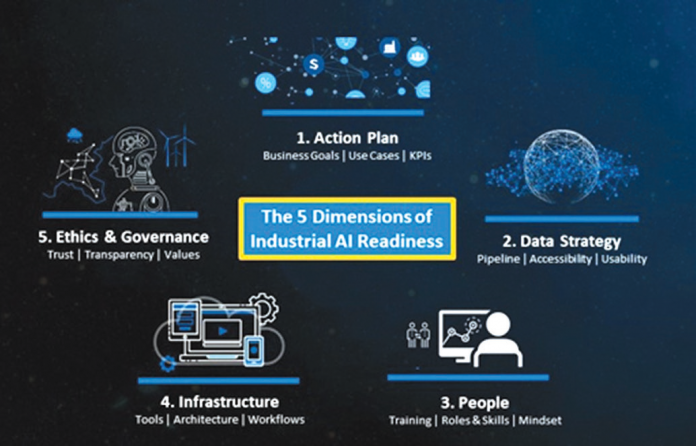Abstract
Organisations will deploy targeted, embedded Industrial AI applications combining data science and AI with purpose-built software and domain expertise. This will empower them to open the door to new levels of safety and productivity in their workplace, thereby reating semi-autonomous and autonomous processes for collecting, aggregating, and conditioning live data, then feeding it into intelligence-rich applications.
In 2021 and beyond, Industrial AI, as a new industry category will go mainstream – catalysed by key business drivers, dimensions of readiness and adoption of real-world use cases. To set context, Industrial AI can be defined as a systematic, collaborative, and integrative discipline focusing on developing, embedding, and deploying various machine learning algorithms as fit-for-purpose, domain-specific industrial applications with sustainable business value.
Four business drivers for the adoption of Industrial AI
First, industrial organisations will start focusing on how AI can be applied to address omain-specific industrial challenges. This locks in AI-enabled use cases to tangible business outcomes, which clearly makes the case for widespread Industrial AI adoption.
Second, the barrier to AI adoption will be lowered, as a lack of AI expertise and in-house data science skills among industrial organisations has been a key bottleneck to wider Industrial AI enablement. More organisations will deploy targeted, embedded Industrial AI applications combining data science and AI with purpose-built software and domain expertise. Fit-forpurpose, embedded AI applications will empower users to tackle domain-specific unctions efficiently and successfully with greater accuracy, reliability, quality, and ustainability across the industrial asset lifecycle – circumventing the need for niche data science expertise.
Third, organisations are increasingly valuing data as a critical driving force and have become laserfocused on amassing as much of it as possible. Data needs to be capitalised on and leveraged into actionable insights to be worthwhile. Organisations, especially those in capital-intensive industries, will need to shift gears from mass data collection to more strategic industrial data management, with specific focus on data integration, mobility, and accessibility across the business. That opens the door for Industrial AI, and the underlying opportunity for AI-enabled technologies that will allow these organisations to reap the hidden value in their industrial data sets.
Finally, the biggest driver for Industrial AI is the undeniable productivity increases for capital-intensive process industries. Industrial AI enables next-generation asset optimisation solutions to be implemented without needing to rely on large-scale data science expertise. This empowers industrial organisations to open the door to new levels of safety and productivity in their workplace, creating semi-autonomous and autonomous
processes for collecting, aggregating, and conditioning live data, then feeding it into intelligence-rich applications. The end results are new insights, continuous operational improvements and faster and more accurate decision making.
Five dimensions to be Industry AI ready
First, companies need to have a clear action plan that maps AI to business goals, data objectives and KPIs to weave Industrial AI into your digital transformation strategy. Business leaders need to think more broadly than one-off use cases – and an action plan that aligns AI capabilities with overarching business goals.
An overarching industrial data strategy is required – companies need to have accessible, valuable data that can be leveraged constructively by Industrial AI. Garbage in/garbage out is a data problem that afflicts the industrial sector as it does any other industry, so building a strategy around quality and efficient data flows is paramount. That means building a pipeline of industrial data that enables AI solutions to process different types and amounts of data required by each use case and application, and scaling this across the entire organisation, so that every user and function of the AI gets consistent performance and results.
A future-proof Industrial AI infrastructure necessitates the need to lay the groundwork for Industrial AI readiness, requiring a broad collaboration across industrial environments. In fact, the software, hardware, architecture, and personnel elements will form the building blocks of your Industrial AI infrastructure. And that infrastructure is what empowers organisations to take their Industrial AI proof-of-concepts and mature them into real, tangible solutions that drive ROI. An Industrial AI infrastructure needs time to accelerate the market, build operational flexibility and scalability into AI investments and seek to harmonise the AI model lifecycle across all applications.
Roles, skills, and training are critical. Executing Industrial AI properly relies on having the right people in charge of that execution. That means making a deliberate effort to cultivate the skills, mindsets and approaches needed to create and deploy AI-powered initiatives across the organisation. Business leaders need to invest in significant levels of workforce, retraining in the coming years to make sure their people are best equipped to deploy Industrial AI.
Finally, ethical and responsible AI use is predicated on transparency, and transparency involves keeping everyone in the loop: creating clear channels of communication,
reliable process documentation and alignment across all stakeholders, so that everyone’s on the same page about the Industrial AI’s benefits, limits and uses. The whole premise of Industrial AI is bringing together the best of both worlds in people and AI, and making the two greater than the sum of their parts. The above is just a guideline, but it is worth approaching things with a holistic view that considers the technical, people and processes requirements, and ultimately lays out your organisation’s own definition of success.
Top three use cases to bring your Industrial AI strategy to life
The starting point of any organisational strategy begins with identifying the business problems, corporate objectives, and strategic goals that Industrial AI can solve. Organisations looking to drive true business value can take inspiration from these three specific business use cases to unlock the power of Industrial AI, combining data science and AI with software and domain expertise to deliver comprehensive business outcomes for the specific business needs of capital-intensive industries.
Predictive maintenance is the single largest use case for Industrial AI, estimated to have made up more than 24 percent of the total market in 2019, according to the IoT analytics research report referenced above. Predictive maintenance detects deviations from normal behavior, and prescribes detailed actions to mitigate or solve future problems – all with the goal of optimising output and reducing downtime.
The second use case focuses on quality and reliability. Quality shows how well an object performs its primary function, while reliability shows how well the object maintains its original level of quality over time, through various conditions. Both are significant measurements in an industrial setting and Industrial AI enables an organisation to achieve a specific and accurate understanding of the two, saving time and money.
Third, process optimisation leverages advanced ML methods, including reinforcement learning and sophisticated deep learning neural networks, to infer information and intelligence from different data sources, assets, and processes. With this, organisations can easily identify and mitigate inefficiencies, which have a direct impact on productivity – the primary economic driver of any industrial enterprise organisation. The use cases outlined above are a concise and clear starting point for any organisation building out or redesigning their Industrial AI strategy, and hoping to accelerate time to value in turn.
































